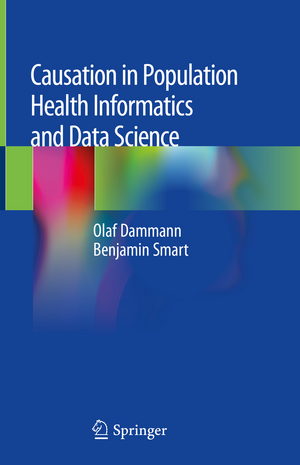Causation in Population Health Informatics and Data Science
Autor Olaf Dammann, Benjamin Smarten Limba Engleză Hardback – 8 noi 2018
Causation in Population Health Informatics and Data Science provides a detailed guide of the latest thinking on causal inference in population health informatics. It is therefore a critical resource for all informaticians and epidemiologists interested in the potential benefits of utilising a systems-based approach to causal inference in health informatics.
| Toate formatele și edițiile | Preț | Express |
|---|---|---|
| Paperback (1) | 817.49 lei 38-44 zile | |
| Springer International Publishing – 11 ian 2019 | 817.49 lei 38-44 zile | |
| Hardback (1) | 833.25 lei 17-23 zile | +72.29 lei 5-11 zile |
| Springer International Publishing – 8 noi 2018 | 833.25 lei 17-23 zile | +72.29 lei 5-11 zile |
Preț: 833.25 lei
Preț vechi: 877.11 lei
-5% Nou
Puncte Express: 1250
Preț estimativ în valută:
159.46€ • 165.87$ • 131.65£
159.46€ • 165.87$ • 131.65£
Carte disponibilă
Livrare economică 20-26 martie
Livrare express 08-14 martie pentru 82.28 lei
Preluare comenzi: 021 569.72.76
Specificații
ISBN-13: 9783319963068
ISBN-10: 3319963066
Pagini: 135
Ilustrații: IX, 134 p. 15 illus., 1 illus. in color.
Dimensiuni: 155 x 235 x 14 mm
Greutate: 0.42 kg
Ediția:1st ed. 2019
Editura: Springer International Publishing
Colecția Springer
Locul publicării:Cham, Switzerland
ISBN-10: 3319963066
Pagini: 135
Ilustrații: IX, 134 p. 15 illus., 1 illus. in color.
Dimensiuni: 155 x 235 x 14 mm
Greutate: 0.42 kg
Ediția:1st ed. 2019
Editura: Springer International Publishing
Colecția Springer
Locul publicării:Cham, Switzerland
Cuprins
Introduction.- Data Interpretation.- Data Generation.- Informatics.- Philosophy.- Causal inference.- Knowledge Integration.- Systems Thinking.- Summary and conclusion.
Notă biografică
Olaf Dammann, M.D. (U Hamburg, ’90), S.M. Epidemiology (Harvard, ’97) is Professor of Public Health and Community Medicine, Pediatrics, and Ophthalmology at Tufts University School of Medicine in Boston, USA. He is also Editor-in-Chief Emeritus of PEDIATRIC RESEARCH, the publication of the International Pediatric Research Foundation. His research interests include the elucidation of risk factors for brain damage and retinopathy in preterm newborns, the theory of risk and causation in biomedical and population health research, and the development of computational chronic disease models. He has received grant support from the National Institutes of Health and the European Union. His bibliography lists more than 200 publications.
Dr Benjamin Smart is senior lecturer at The University of Johannesburg, and a founder member of The African Centre for Epistemology and Philosophy of Science. He was awarded a PhD in metaphysics by The University of Nottingham in 2012, before lecturing philosophy at The University of Birmingham (2012-2015). Smart has published widely on causation, laws of nature, and on the philosophy of health and disease.
Dr Benjamin Smart is senior lecturer at The University of Johannesburg, and a founder member of The African Centre for Epistemology and Philosophy of Science. He was awarded a PhD in metaphysics by The University of Nottingham in 2012, before lecturing philosophy at The University of Birmingham (2012-2015). Smart has published widely on causation, laws of nature, and on the philosophy of health and disease.
Textul de pe ultima copertă
Marketing text: This book covers the overlap between informatics, computer science, philosophy of causation, and causal inference in epidemiology and population health research. Key concepts covered include how data are generated and interpreted, and how and why concepts in health informatics and the philosophy of science should be integrated in a systems-thinking approach. Furthermore, a formal epistemology for the health sciences and public health is suggested.
Causation in Population Health Informatics and Data Science provides a detailed guide of the latest thinking on causal inference in population health informatics. It is therefore a critical resource for all informaticians and epidemiologists interested in the potential benefits of utilising a systems-based approach to causal inference in health informatics.
Causation in Population Health Informatics and Data Science provides a detailed guide of the latest thinking on causal inference in population health informatics. It is therefore a critical resource for all informaticians and epidemiologists interested in the potential benefits of utilising a systems-based approach to causal inference in health informatics.
Caracteristici
Reviews intersections between epidemiology, public health, computation, informatics, and science philosophy
Suggests a new theory for the integration of epidemiology, public health, computation, informatics, and science philosophy to improve public health research
Evaluates how informatics and computational approaches can aid the identification of causal associations in the health sciences
Suggests a new theory for the integration of epidemiology, public health, computation, informatics, and science philosophy to improve public health research
Evaluates how informatics and computational approaches can aid the identification of causal associations in the health sciences
